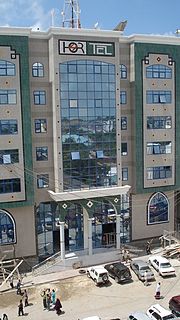
Communications in Afghanistan is under the control of the Ministry of Communications and Information Technology (MCIT). It has rapidly expanded after the Karzai administration took over in late 2001, and has embarked on wireless companies, internet, radio stations and television channels.

Communications in Somalia encompasses the communications services and capacity of Somalia. Telecommunications, internet, radio, print, television and postal services in the nation are largely concentrated in the private sector. Several of the telecom firms have begun expanding their activities abroad. The federal government operates two official radio and television networks, which exist alongside a number of private and foreign stations. Print media in the country is also progressively giving way to news radio stations and online portals, as internet connectivity and access increases. In 2012, a National Communications Act was also approved by Cabinet members, and 2 October 2017, the president of Somalia Finally signed the National Communications Law, and became the official Law that regulated the ICT industry. Under that Law, National Communications Authority (NCA) of the federal Republic of Somalia has been established, with board of directors and a general manager. Somalia currently is ranked first in Africa for most affordable mobile data per gigabyte and 7th in the world.
There are a number of systems of communication in Uganda, including a system of telephony, radio and television broadcasts, internet, mail, and several newspapers. The use of phones and the internet in Uganda has rapidly increased in the last few years.

This a survey of the postage stamps and postal history of the Russian Empire, the Soviet Union and the modern Russian Federation.

Posti Group Oyj, trading internationally as Posti Group Corporation, is the main Finnish postal service delivering mail and parcels in Finland. The State of Finland is the sole shareholder of the company. Posti has a universal service obligation that entails weekday deliveries of letters in all of Finland's municipalities. Posti's head office is located in Pohjois-Pasila in Helsinki. Posti's history spans nearly 400 years.
Pošta Srbije is the national postal service of Serbia, with the headquarters in Belgrade. Public postal service was first introduced in Serbia in 1840. The first stamp was printed in 1866. In 1874 it founded the Universal Postal Union together with 21 other countries.
Pakistan Post is a state enterprise which functions as Pakistan's primary and largest postal operator. 49,502 employees through a vehicle fleet of 5,000 operate traditional "to the door" service from more than 13,419 post offices across the country, servicing over 50 million people. Pakistan Post operates under the autonomous "Postal Services Management Board" to deliver a full range of delivery, logistics and fulfillment services to customers. In addition to its traditional role, Pakistan Post also offers services such as Postal Life Insurance and Pakistan Post Savings Bank. It also operates services on behalf of the federal and provincial governments, by acting as a collection point for tax and utility bills.

Croatian Post Inc., founded in 1999, is a business corporation in ownership of the Republic of Croatia. Croatian Post is a national postal operator of the Republic of Croatia. Post offices of the Croatian Post form one of the widest services and retail networks in the country. Apart from postal services Croatian Post offers also payment services, retail services and digital TV service in the whole territory of Croatia. Croatian Post is also one of the founders and a full member of the Association of European Public Postal Operators (PostEurop), while Croatia is a member of the Universal Postal Union (UPU). Croatian Post also issues postage stamps of Croatia.

Tanzania Telecommunications Corporation, formerly Tanzania Telecommunications Company Limited (TTCL), is the oldest and largest fixed line telecommunications company in Tanzania. The company comes forth from the former Tanzania Posts and Telecommunications Corporation in 1993. TTCL was wholly owned by the Government of Tanzania until the partial privatisation of the company on 23 February 2001.

The Uganda Communications Commission(UCC) is the government regulatory body of the communications sector in Uganda. Although owned by the Ugandan government, it acts independently. Its mandated responsibilities include licensing, regulation, communications infrastructure development and the expansion of rural communications service.

Azərpoçt is the company responsible for postal service in Azerbaijan.

Egypt Post is the governmental agency responsible for postal service in Egypt. Established in 1865, it is one of the oldest governmental institutions in the country.

Tanzania Posts Corporation is the company responsible for postal service in Tanzania and was established in 1994.
The Zambia Postal Services Corporation is also known as ZamPost is a state-owned enterprise in Zambia. ZamPost is the designated operator of postal services in Zambia. The history of postal services in Zambia dates back to 1896 when the first post offices were established at Abercorn, Fort Jemeson, and the Kalungwishi River, near Lake Mweru. However, these post offices did not enjoy international recognition until 1926, when the General Post Office, which was then a government department, was admitted to the general membership of the Universal Postal Union (UPU). In 1975 by an Act of Parliament, a statutory body was established to run both postal and telecommunications.
The Communications Authority of Kenya (CA) is the regulatory Authority for the ICT industry in Kenya with responsibilities in telecommunications, e-commerce, broadcasting and postal/courier services. The CA is also responsible for managing the country’s numbering and frequency spectrum resources, administering the Universal Service Fund (USF) as well as safeguarding the interests of users of ICT services.

The postal history of Hungary is strongly linked to the history of Hungary. While a messenger system was brought to the Carpathian Basin by Árpád as early as 895, modern mail delivery was first organized by the Habsburgs under the Austrian Empire.

PTT, an abbreviation for Posta ve Telgraf Teşkilatı, is the national post and telegraph directorate of Turkey. Formerly, the organization was named Posta Telgraf Telefon. After the privatization of the telephone telecommunications service business, the directorate was renamed, keeping its acronym. It is headquartered in Ankara, and is known as TURKISH POST internationally.

The North Korean Postal Service or Korean Post is operated by the Ministry of Post and Telecommunications and Communication Maintenance Bureau, which oversees postal communications, telegrams, telephone services, TV broadcasts, newspapers and other related matters.

Turkmenpost, is the national postal operator of Turkmenistan. The company is responsible for the delivery of mail and issuing postage stamps. It has been a member of the Universal Postal Union since January 26, 1993. Turkmenpost employs about 2,000 people and has over 146 post offices, with its headquarters in Ashgabat.
Ministry of Communications is a union ministerial agency under the Government of India responsible for telecommunications and postal service. It was carved out of Ministry of Communications and Information Technology on 19 July 2016. It consists of two departments viz. Department of Telecommunications and the Department of Posts.















